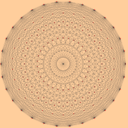Contributed talks: Borisov: On some polynomials allegedly related to the abc conjecture
If one tries to follow the easy proofs of the abc conjecture in the geometric case by using quantum deformation of integers instead of differentiation of polinomials, some family of polynomials appears. It turned out that these polynomials were previously studied in a certain case by J.-L. Nicolas and A. Schinzel, and then by M. Filaseta for different reasons, in particular for the question of their irreducibility. Conjecturally they are always irreducible. I will discuss the proof of their irreducibility for the set of coprime triples $a+b+c=0$ having density one. Though this result is hardly related to the $abc$ conjecture, its proof utilizes the distribution of roots of these polynomials in the usual and $p-$adic complex numbers for $p|abc$ and has some flavor of the $abc$ conjecture.
Frankenhuysen: abc implies Roth's theorem and Mordell's conjecture
By recent work of Elkies (1991), abc implies effective Mordell. And in 1994, Bombieri showed that abc implies Roth's theorem about approximation of an algebraic number by rationals. The proofs of these two theorems are very similar. In this talk, I compare the two proofs. I will also show how a stronger form of Roth's theorem could follow from ABC.
Luca: On the equation x^y+y^x=z^n (joint work with M. Mignotte)
Let a,b, and c be three non-zero integers. The ABC conjecture implies that the equation ax^y+by^x=cz^n has finitely many integer solutions (x,y,z,n) where x,y, and n are greater than 1 and g.c.d.(x,y)=1. Let P be a fixed set of primes. Using lower bounds for linear forms in logarithms of algebraic numbers, we can show that the equation has finitely many solutions such that one of x,y, or z is divisible only with primes from P. Using explicit lower bounds for linear forms in logarithms of two algebraic numbers Mignotte was able to show that the equation x^y+y^x=z^2 has no integer solutions (x,y,z) such that x,y are larger than 1, relatively prime, and one of them is even. Recently, in joint workk with M. Mignotte and Y. Roy, we proved that the equation x^y+(-)y^x=n_1!...n_k! with x,y greater than 1 and odd, and n_i greater than 1 has no solutions. We can also show that the equation x^y+(-)y^z+(-)z^x=n! with x,y,z greater than 1, relatively prime has finitely many solutions. Unfortunately, our present bounds for the solutions of this equation are not within computer reach.
Wang: Some diophantine approximation problems over function fields
We generalize the analogy of Cartan's theorem and Cartan's conjecture. We then use a method of Vojta to show an effective Wirsing's theorem over function fields of zero characteristic.
J. Yu: On Ankeny-Artin-Chowla's conjecture and abc
A well-known conjecture of Ankeny-Artin-Chowla states that if $L$ is a real quadratic number field with prime discriminant $p$, then the conductor of the fundamental unit of $L$ is not divisible by $p$. We explore the possible connection of this conjecture with the abc conjecture.
K. Yu: p-adic logarithmic forms and group varieties
Recently, C. L. Stewart and I improved our work "On the abc conjecture", Math. Ann. 291(1991), 225-230, to the effect that 2/3 in the theorem of that paper can be replaced by 1/3. This improvement is based on my recent two papers "P-adic logarithmic forms and group varieties I, II" (recently submitted).
|
